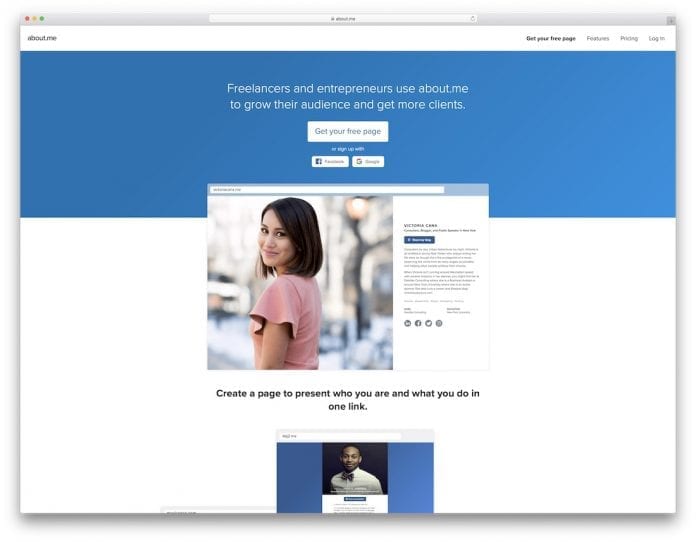Searching for jobs is tough. Joining a networking platform like LinkedIn can help, but you’re nothing more than your profile there. You have no way to stand out from the crowd. If you feel like you have a lot of unique qualities to bring to your employers, why not offer them a chance to see how unique you are?
Well, I’m here to ease your troubles and frustrations and let you know exactly what’s what on this key issue. A personal website might just be the best solution for you in order to stand out from other candidates in your job search.
Wait … so what’s LinkedIn?

In case you’re not familiar, I’m going to start by informing you about what exactly LinkedIn is. LinkedIn functions a lot like an online resume. More precisely, according to Business Insider, “LinkedIn is a professional networking site, designed to help people make business connections, share their experiences and resumes, and find jobs.”
LinkedIn is a great tool for making social connections; so much so that it’s deemed absolutely necessary for the business world today. But it’s not so helpful for standing out from the competitors.
Why you shouldn’t just be on LinkedIn
And now, I’m here to inform you why you should forget about relying only on LinkedIn.
LinkedIn is overwhelming, or at least it can be for most people. Because it’s a popular storage complex of resumes, it’s turned into a bit of a social network of things. LinkedIn, unfortunately, can make it easy to lose focus on the whole “finding a job” aspect. This is due to the ads you’re bombarded with, the paradox of “friends” who you’ve never met before in your life, your connections’ recent accomplishments and milestones appearing on your feed, news stories you don’t really care about, and so forth.
Additionally, LinkedIn offers no customization whatsoever. It’s pretty standard and basic. Although you’re a unique person, different in your own right, with your own set of accomplishments and skills, you’re forced to fit the status quo. The same display on every profile does nothing to help you stand apart from other competitors. You could be stuck in the crowd forever!
So what’s the alternative?

A personal website, of course!
The times have changed, my friend. As a professional, more is expected of you—now more than ever. It’s a hard task, but it’s doable. A personal website makes for an easy solution.
Having a well crafted personal brand is important. Perhaps it doesn’t seem like that big a deal, but I can’t stress enough the difference it can make in your professional endeavors. Advancements in technology have prompted people to brand themselves in more advanced ways as well.
Why you should create a personal website
There are two important reasons; a personal website serves a much different purpose than your LinkedIn profile does (as it goes far beyond what a typical resume is capable of), and it allows you to create a brand for yourself. In other words, you get to be the brand and not merely be branded. Sure, a LinkedIn profile is a viable option for profiling your resume, but it’s not the best. What if a job recruiter wants to get to know you better? That’s not an option on LinkedIn, but you can do it all from a personal website. A personal website offers a recruiter a glimpse into your world—what you value, what you believe in, what your work ethic is, and how you approach work on a deeper, more complex level, and that’s just for starters. A personal website embodies your persona, giving you a chance to create and embolden it, aiding the recruiter in picturing your expertise and what you could potentially offer. Moreover, a personal website gives them the chance to become even more excited about you. If you brand yourself carefully, it can be hard for them NOT to begin to imagine you as the best possible fit for their job!
Going back to the second point, a personal website allows you to create a brand for yourself. Because job recruiters typically do a huge amount of research on their hires, they’re especially perceptive at reading in to the minutiae of your personal brand. You don’t want to send the wrong message, especially by NOT having a strong and sturdy set of online search results for you, the point of sale, the jack of all trades, the business-of-one. Failing to appear in search results could lead them to think you’re either not technologically advanced, you’re not interesting, you haven’t nothing worthwhile to share about your professional work life, or even that there’s something you’re cautiously hiding. Give them something good, take ownership of your brand, and send them the right message by proving yourself professional, fascinating, and compelling.
Let’s let the numbers do the talking: according to U.S. News, “56% of all hiring managers are more impressed by a candidate’s personal website than any other personal branding tool” . Moreover, “a 2014 Jobvite survey of human resources professionals reveal[ed] that 93% of recruiters will review a candidate’s social media profile before making a decision, and that candidate information found on the Web influences their hiring decisions.” But here’s the thing: “only 7% of job seekers actually have a personal website.”
Didn’t think you have a chance of standing out, even with a website? Think again. Just having that tool available for job recruiters to see already sets you apart from 93% of your competition.
So what should a personal website include?

That’s completely up to you!
Some good ideas you might consider implementing on your personal website include any of your professional goals, focusing on what you would like to accomplish down the line. A good place to start is to include an “About Me” page, communicating who you are and what you do as well as any credentials you may have.
You should also include your contact or social media information. I strongly emphasize this point, as your contact information on your personal website is essential in allowing any job recruiter to reach out to you. Make it easy for them to reach out to you by including as many outlets as possible. Put down an email, and if possible a phone number, but if you have a professional twitter, include that too. You can also include your LinkedIn, and anything else you feel comfortable allowing recruiters to contact you through.
A professional picture of yourself is also a necessity. Make sure it’s flattering and that you’re dressed in a work-appropriate outfit. For a job recruiter, they’ll feel better knowing they’ve got a face to the name.
Also, you might want to include your skill set, especially if you have skills that require more than a single word to fully explain. A personal website is great for allowing that skill to shine in its own spot.
Other ideas you could further implement on your personal website could also be your portfolio, a blog (if you’ve got one), case studies, your resume, testimonials and recommendations, and even a company-specific page if you’re absoluting aching to work for a specific company. Just make sure not to conglomerate all this information into one web page. Make separate pages to ensure clarity.
Additionally, your personal website is really a highlight reel of your online life, a hub all about you, enabling you to stand out. Don’t be afraid to brand yourself; job recruiters like to see the real you, instead of another person trying to fit their mold. Confidence is key, my friend!
Some final tips to keep in mind:
- Have a professional URL, and don’t forget to renew it annually or every few years. Companies like 101domain can be used to register and protect your domain. Click here to find out more.
- Hire a proofreader to avoid any potentially embarrassing spelling and/or grammar mistakes
- Check for broken links—everything should be moving like clockwork on your site
- Have a simple, clean, easy-to-navigate website design
And at the end of it all: keep it short and to the point. The worst thing that could happen is enticing a prospective employer with a really captivating website, only to have them become bored over prosaic text boxes or endless lists.
LinkedIn and personal website, a win-win situation
Creating and building a personal website is a great alternative to a standard, basic LinkedIn profile. Still, both these platforms can come in handy and can be ideal complements of each other. In fact, there’s nothing wrong with double dipping here! Why not take advantage of both?

Having a LinkedIn is beneficial in more ways than one. To start, so many job recruiters and human resources professionals are already on the Website, and if you’re absent, it could lead them to wonder why you’re not on it as well. Any professional understands that in order to be deemed “Internet savvy,” being on LinkedIn is at the forefront of the agenda. Additionally, LinkedIn offers an expanse of job listings. It’s a place where you can make those important business connections and join professional groups, reach out to people viewing your profile, and give and receive endorsements and testimonials.
As you know by now, networking is a huge part of any job. LinkedIn is a great tool in that right. It is a robust social connection platform for you and the business world. And a personal website just seals the deal, especially if you’re truly serious about presenting yourself in the best light. A great thing to do is chum the waters, so to speak, with a solid LinkedIn profile, and then reel in prospective employers with a website that helps you stand out.
Don’t wait! The longer you abstain from creating and building your personal brand and online presence, the harder it will be for you in the long run. Don’t let it get behind you, stay on top—especially if you’re an Internet guru. You gotta know your stuff.









